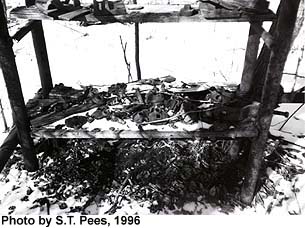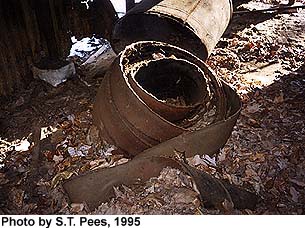|
|
Floors and Shelves
Once inside a power, even if the walls and roof are partly fallen, a vast trove of fittings, tools, spare parts, oil cans, buckets, oil rags, gloves, dirty shirts and other gems come to light. These are on the shelves, work benches, hung on nails, or here and there on the dirt floor. The operation can be dated by the brand names on the cans (many long gone or underwent a change in design).
The winds have blown in the leaves of many seasons. These seem to be particularly caught in the shelves and niches. Every power has a resident mouse which makes a nest in the leaves. Hunters are temporary occupants, the power serving as a blind and, if the walls are present, as a shelter.
The batch of parts and odds and ends tells a lot about what went on there. And there are probably more items than meet the eye. Some must have been pressed into the dirt floor by the workmen's boots others are probably hidden by the leaves. Abandoned powers, being complex artifacts of the oil industry, may be future sites for scholarly excavation.
 |
The walls of this power are gone but the shelves, covered by fittings, still stand.
The most obvious parts on the lower shelf are grip couplings for the rod lines. An eccentric yoke is at the right.
|
|
|
 |
Debris of the seasons, odd parts and an empty Quaker State Motor Oil container are present on this corner shelf which is in a roughly built cabinet.
|
|
|
 |
The top of a work bench.
|
|
|
 |
This view of a power's floor shows a length of belt that once drove the power
from the engine. Pails are often found inside and out. All leak now. Small fittings are hidden by the leaves.
|
|
|

![]()



